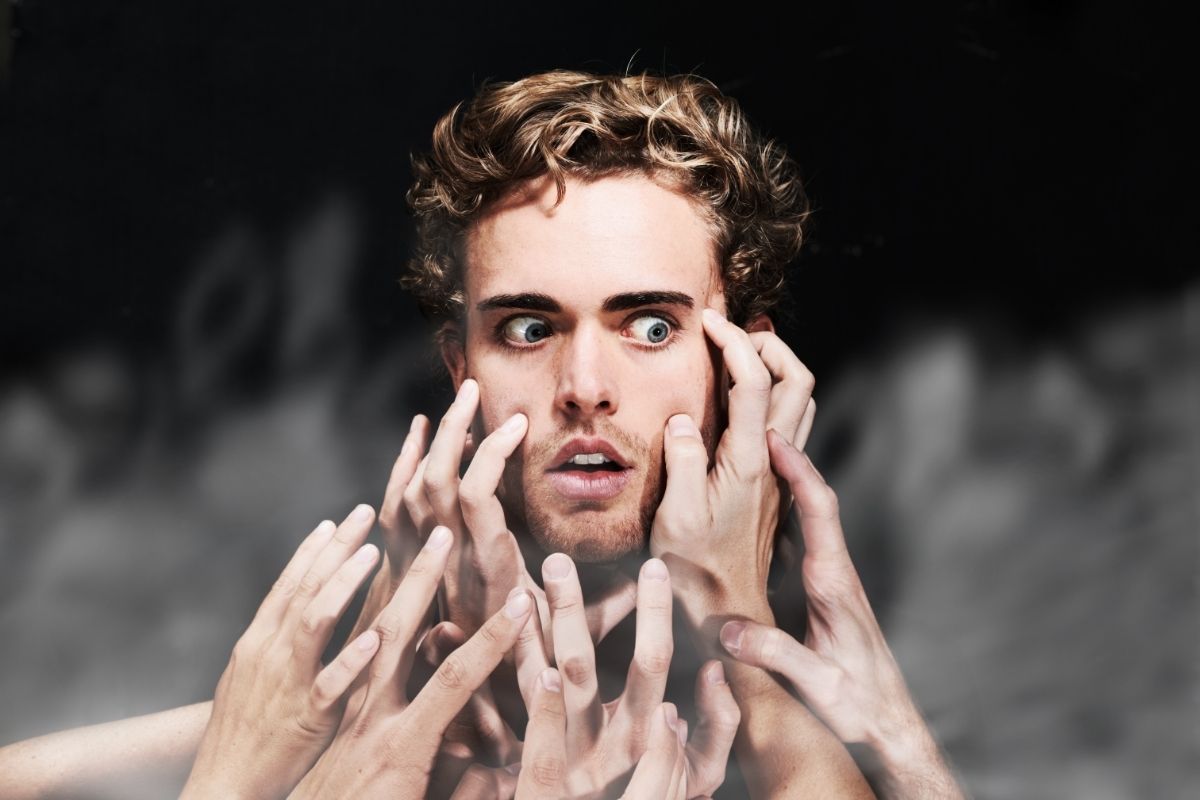Can Stress Cause Hallucinations?

Stress can make you see things that aren’t there.
It’s like your brain’s playing tricks on you, turning shadows into monsters and whispers into shouts.
Imagine your mind as a TV.
Now, picture stress as a mischievous kid with the remote control.
When stress cranks up the volume, suddenly you’re seeing and hearing things that aren’t on the regular program.
This article is your backstage pass to the wild world of stress-induced hallucinations.
You’ll discover why your brain goes haywire when you’re stressed, and how to change the channel back to reality.
Buckle up, buttercup!
We’re diving deep into the rabbit hole of your stressed-out noggin.
By the end, you’ll be a pro at handling your mind’s special effects department.
Everyone who’s ever felt like they’re losing their marbles during a stressful time will benefit from this guide.
It’s like a stress survival manual, but way more fun to read.
Stress and Your Brain: A Wild Ride
Stress isn’t just a party pooper for your mood.
It’s like a bull in a china shop when it comes to your mental health.
Scientists have been poking around in our heads and found something wild.
Chronic stress isn’t just giving you anxiety and the blues.
It’s also setting the stage for a full-blown Broadway show in your brain – complete with imaginary actors!
We’re talking about psychotic disorders here.
That’s fancy doctor talk for conditions where your brain takes a vacation from reality.
These brain vacations can include schizophrenia and bipolar disorder.
They’re like unwanted guests that crash your brain’s party, bringing along their weird friends: delusions and hallucinations.
Doctors often treat these party crashers with antipsychotics.
These meds are like bouncers for your brain, kicking out the troublemakers.
But here’s the kicker: these brain bouncers don’t always work great.
Sometimes they’re like sleepy security guards, and they can even cause some trouble of their own.
So, how does stress turn your brain into a reality TV show?
Let’s dive in and find out!
How Stress Turns Your Brain into a Movie Theater
Here’s the scoop: stress isn’t the director of this weird brain movie.
It’s more like the annoying guy who keeps kicking your seat in the theater.
When you’re stressed, your body goes into superhero mode.
It’s called the fight-or-flight response, and it’s like your body’s personal bodyguard.
But sometimes, this bodyguard gets a little too jumpy.
It starts seeing threats everywhere, even in your own thoughts!
This can lead to a whole carnival of mental funhouse mirrors.
You might start feeling anxious, down in the dumps, or like your emotions are on a roller coaster.
But wait, there’s more!
Stress isn’t the only troublemaker here.
Sometimes, hallucinations can pop up like unexpected guests at a party.
They might show up if you’ve been hitting the sauce too hard, or even from some medications your doctor gave you.
Some illnesses can also invite hallucinations to the party.
We’re talking about serious stuff like cancer, kidney or liver problems, or brain diseases like dementia.
The most common hallucination is hearing voices.
It’s like your brain’s got its own radio station, but you’re the only one who can tune in.
This happens because the part of your brain that deals with sound gets a little too excited.
It’s like a DJ that’s had way too much coffee!
Stress and Hallucinations: Best Frenemies Forever?
Back in 2010, some clever scientists did a study.
They found out that people who had more stressful stuff happen to them were more likely to see or hear things that weren’t there.
And get this – it didn’t matter if these folks had any other mental health issues before.
It’s like stress opened up a door in their minds, and hallucinations decided to walk right in!
But hold your horses!
This doesn’t mean stress is the bad guy who’s making you see things.
It’s more like stress is the friend who introduces you to some questionable characters.
There are other factors that might be inviting hallucinations to your brain’s party:
– **Your family tree** – Some folks are just more likely to hallucinate, thanks to their genes.
It’s like inheriting your grandma’s nose, but weirder.
– **Where you live** – If your neighborhood sounds like a 24/7 rock concert, you might start hearing things.
Your brain gets confused and starts making up its own tunes!
– **The pills you pop** – Some meds can make you see things.
Even the ones that are supposed to make you feel better, like antidepressants, can sometimes backfire.
– **What’s on your plate** – If you’re not eating right, your brain might not get all the good stuff it needs.
And a hungry brain can do some pretty strange things!
Taming Your Mind’s Wild Imagination
So, what do you do if your brain starts putting on its own magic show?
Don’t panic!
Most of the time, hallucinations are like annoying telemarketers – they’ll go away if you ignore them.
But if these mind tricks are starting to freak you out, it’s time to call in the pros.
Your doctor’s like a detective – they’ll look for clues to figure out what’s causing your brain’s special effects.
Once they’ve ruled out any serious stuff, they might suggest some brain-calming medicine.
These come in two flavors:
The Brain Bouncers
For mild cases of seeing things, your doc might prescribe a tiny dose of antipsychotics.
These meds have fancy names like Risperdal Consta, Abilify, and Zyprexa.
They’re like nightclub bouncers for your brain, keeping the rowdy thoughts in line.
These meds work by messing with a brain chemical called dopamine.
Dopamine’s like the life of the party in your brain – it controls movement, attention, and feeling good.
In some conditions like schizophrenia, the brain’s dopamine party gets out of hand.
Antipsychotics are like party poopers – they calm things down.
But like any good bouncer, these meds can sometimes be a bit rough.
They might make you gain weight, feel sleepy, or give you a dry mouth.
In rare cases, they can even make you do the antipsychotic shuffle – uncontrollable movements of your face and tongue.
Not exactly the dance moves you want!
The Brain Whisperers
If pills aren’t your thing, there’s always talk therapy.
It’s like having a personal trainer for your brain.
Talk therapy won’t make the hallucinations disappear like magic, but it can help you deal with them better.
It’s like learning to ignore that annoying neighbor who always mows their lawn at 6 AM.
Psychotherapy is all about understanding your thoughts and feelings.
It’s like being your own brain detective.
Sometimes, docs combine talk therapy with meds.
It’s like a one-two punch against hallucinations.
If regular talk therapy isn’t cutting it, there’s always cognitive behavioral therapy (CBT).
It’s like a boot camp for your brain, teaching it new tricks to handle tough situations.
CBT is great for stubborn hallucinations, especially if they come with weird beliefs that don’t make sense.
Wrapping Up This Mind-Bending Journey
Stress is like that friend who always shows up uninvited.
You can’t avoid them completely, but you can learn to deal with them better.
First step: figure out what’s stressing you out.
Is it your job?
Your relationship?
That weird noise your car’s been making?
Once you know what’s bugging you, you can start working on fixing it.
Sometimes, you might need a pro to help you out.
That’s okay!
It’s like calling a plumber when your sink’s clogged – sometimes you need an expert.
Remember, living with hallucinations can be super stressful.
And stress can make hallucinations worse.
It’s like a never-ending loop of weirdness.
So don’t be afraid to ask for help.
Hand over the remote control of your brain to someone who knows how to fix the picture.
With the right help, you can turn down the volume on those stress-induced hallucinations and get back to enjoying your brain’s regular programming.

Author: Michelle Landeros, LMFT
Michelle Landeros is a Licensed Marriage Family Therapist (LMFT). She is passionate about helping individuals, couples and families thrive.









